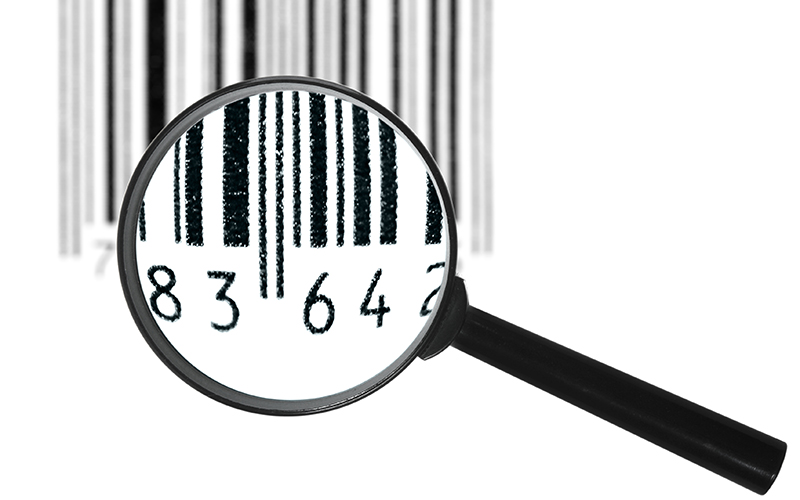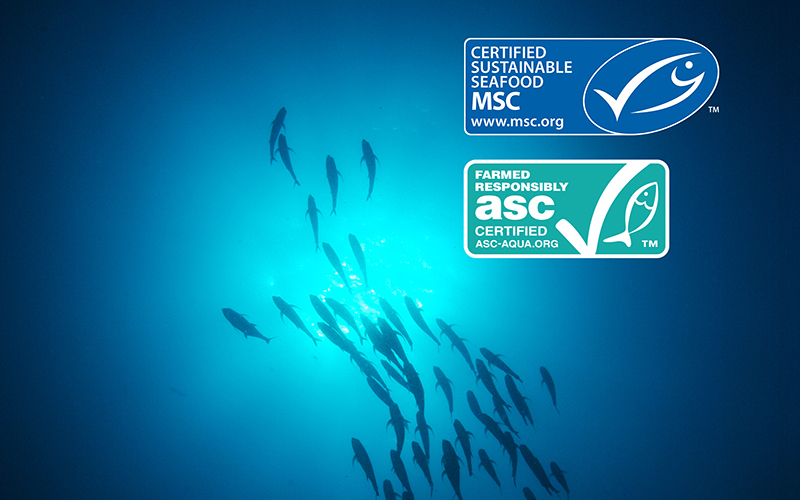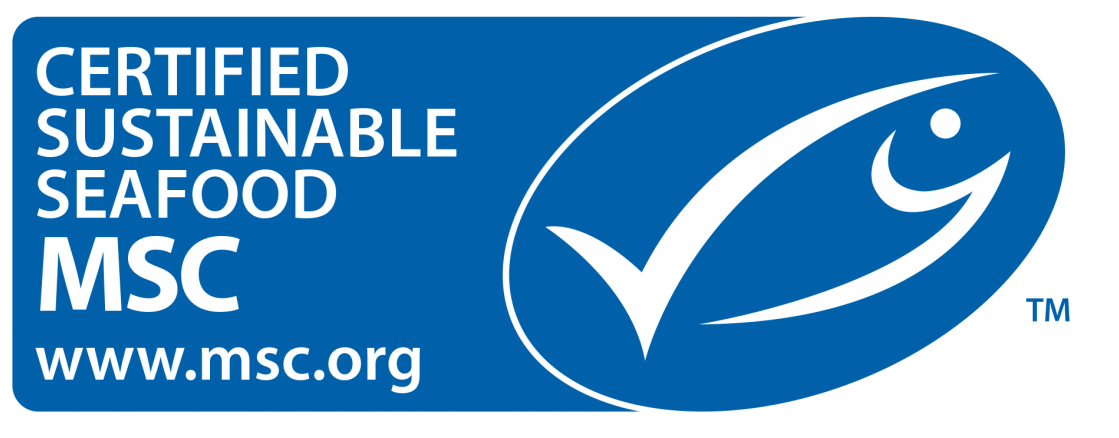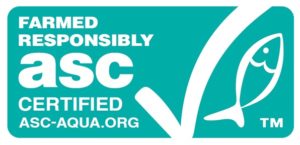
Sole Mare is committed to preserving fish populations and protecting our fragile marine ecosystems.
Read moreSole Mare is committed to preserving fish populations and protecting our fragile marine ecosystems, which is why we source our seafood exclusively from responsible and sustainable fisheries.
Sustainability is more than just the method in which seafood is harvested. In order to ensure an abundance of fresh and varied seafood species for future generations, we believe that we have a moral obligation to protect our ocean ecosystems. Sole Mare selectively procures a specialty seafood range from species that are not in danger of overfishing or significantly under any stress. Further, for all of our specialty seafood products, Sole Mare guarantees its products are 100% sustainably caught, with no use of Fish Aggregating Devices (FADs) and in accordance with strict industry standards and regulations.
Sole Mare has an absolute commitment to not source fish from marine reserves, overfished areas and other such waters that are out-of-bounds. Wherever possible, Sole Mare is also committed to sourcing its seafood from waters certified by the Marine Stewardship Council (MSC) or similar third party accreditation[1] because we want to make the right choice for our planet as much as you do.
Sole Mare exclusively sources tuna that is Pole and Line caught or 100% FAD Free. These fishing methods help ensure there is no destructive overfishing and are highly selective, minimising the chance of other marine life (such as shark, turtles, whales and dolphins) being harmed. Further, as Pole and Line Fishing results in tuna being pulled from the ocean one by one, it naturally requires more coastal fisherman per tonne of catch, thereby providing vital employment to local fisherman whilst keeping the damaging industrial fishing vessels ships out of the waters.
Sole Mare is proud that our tuna is 100% Dolphin Safe certified. Sole Mare condemns any shark finning practises in our supply chain and will not transact with any parties that partake in shark finning.
Sole Mare only sources from approved FAO catchment areas and each catch is 100% traceable from ship to shelf, to ensure safe and sustainable specialty seafood.
Sole Mare ensures that tuna only comes from stock areas that are deemed to be sustainable for the targeted species and use latest ISSF (International Seafood Sustainability Foundation)[2] data to change sourcing zones each year.
Consumers are able to confidently know where their tuna was sourced as the specific fishing zone for the product is printed on each tin. Our internal auditing system allows for Sole Mare to trace any tin of tuna down to the individual fishing vessel, fishing zone and period of catch.
Follow the Fish Journey and send us your details accompanied by the alphanumeric code printed on the tin here to trace the origin on the product purchased.
We condemn the use of transhipments of tuna at sea and unregistered illegal fishing activities. Sole Mare will not purchase from suppliers who source from vessels that have been listed on any official blacklist and ensures that all vessels are compliant under EUCC (European Catch Certificate)[3] or US Fisheries Certificate of Origin[4].
Sole Mare believes that every worker is entitled to a safe and fair workplace.
Sole Mare ensures all of its tuna is sourced from suppliers who are members of the Supplier Ethical Data Exchange (SEDEX), a world leading not for profit organization dedicated to drive improvements in working conditions and responsible, sustainable ethical business practices in global supply chains, and that its suppliers of all seafood products adhere to our Ethical Trading Standards and Anti-Slavery Policy.
Unfortunately, Modern Slavery practices are known to be prevalent in the seafood industry, however Sole Mare has an absolute zero-tolerance of violations of human rights and serious crimes anywhere in our operations and those of our suppliers.
It is a requirement that all suppliers of our seafood products meet the international standards for labour rights set out for seafood production and that they: provide safe & healthy workplaces for their employees; do not deceitfully recruit for labour or services; do not employ children; pay – at a minimum – the minimum wage according to the local legal standards or industry benchmarks; treat employees equally and fairly irrespective of any religious, ethnic or gender differences; and do not engage in any serious exploitable work practices. These commitments are confirmed by regular third-party auditing of production facilities.
Sole Mare is committed to continuously working with our suppliers and stakeholders to assess potential areas of risk, to ensure transparency and act to take necessary measures for the prevention of any forms of slavery or human rights offences across our operations and supply chain, in accordance with the requirements of the Modern Slavery Act 2018 (Cth).
Looking to the future, Sole Mare is working with its partners to build a more sustainable fishing industry for future generations by supporting additional research into improved fishing techniques and marine parks.
Consumers can trust finding the same rigorous commitment to protecting our environment in every Sole Mare product. By choosing Sole Mare, you are making a specific choice to assist in protecting our marine ecosystems, ensuring ethical workplaces and ensuring the sustainability of seafood for years to come.
[1] Sole Mare is committed to transition its specialty seafood product sourcing to achieve MSC or similar third-party certified seafood. Third party certification may be limited to selected fish types and fishing areas depending on impacts to wild fish populations and ecosystems.
[2] International Seafood Sustainability Foundation – Not for profit organization that undertakes scientific-based initiatives for long term conservation and sustainable us of global tuna stocks. https://iss-foundation.org/
[3] EUCC (European Catch Certification) or EU IUU policy set up to eliminate illegal, unreported and unregulated fishing to ensure that all vessels are correctly registered.
[4] US Fisheries Certificate of Origin Definition –regulates information to accompany each shipment fish species, fishing zone, fishing method/gear, vessel flag, catch period, vessel name, registration and Dolphin safe certification

Interested in the journey of your Sole Mare product? Sole Mare seafood is sustainably fished and completely traceable!
Read moreThe fishing zone is printed on each Sole Mare can, click on the light blue zone to discover more.


Fish species: Scomber Japonicus / Scomber Australasicus
Fishing method: Purse seine and FAD Free
Is this fishing method sustainable: Yes
Is the product 100% traceable: Yes
Reporting/guide used to assess FAO zone sustainability: ISSF annual report
Other sustainability credentials or accreditations: FAO.org
Fish species: Thunnus albacares
Fishing method: Purse seine and FAD Free
Is this fishing method sustainable: Yes
Is the product 100% traceable: Yes
Reporting/guide used to assess FAO zone sustainability: ISSF annual report
Other sustainability credentials or accreditations: Dolphin Safe
Fish species: Thunnus albacares
Fishing method: Purse seine and FAD Free
Is this fishing method sustainable: Yes
Is the product 100% traceable: Yes
Reporting/guide used to assess FAO zone sustainability: ISSF annual report
Other sustainability credentials or accreditations: Dolphin safe
Fish species: Thunnus albacares
Fishing method: Purse seine and FAD Free
Is this fishing method sustainable: Yes
Is the product 100% traceable: Yes
Reporting/guide used to assess FAO zone sustainability: ISSF annual report
Other sustainability credentials or accreditations: Dolphin safe
Fish species: Thunnus albacares
Fishing method: Pole & Line
Is this fishing method sustainable: Yes
Is the product 100% traceable: Yes
Reporting/guide used to assess FAO zone sustainability: ISSF annual report
Other sustainability credentials or accreditations: Dolphin safe and FIP for P/L YF ex Indonesia
Fish species: Thunnus albacares
Fishing method: Pole & Line
Is this fishing method sustainable: Yes
Is the product 100% traceable: Yes
Reporting/guide used to assess FAO zone sustainability: ISSF annual report
Other sustainability credentials or accreditations: Dolphin safe and FIP for P/L YF ex Indonesia
Fish species: Thunnus albacares
Fishing method: Pole & Line
Is this fishing method sustainable: Yes
Is the product 100% traceable: Yes
Reporting/guide used to assess FAO zone sustainability: ISSF annual report
Other sustainability credentials or accreditations: Dolphin safe and FIP for P/L YF ex Indonesia
Fish species: Thunnus albacares
Fishing method: Pole & Line
Is this fishing method sustainable: Yes
Is the product 100% traceable: Yes
Reporting/guide used to assess FAO zone sustainability: ISSF annual report
Other sustainability credentials or accreditations: Dolphin safe and FIP for P/L YF ex Indonesia
Fish species: Thunnus albacares
Fishing method: Pole & Line
Is this fishing method sustainable: Yes
Is the product 100% traceable: Yes
Reporting/guide used to assess FAO zone sustainability: ISSF annual report
Other sustainability credentials or accreditations: Dolphin safe and FIP for P/L YF ex Indonesia
Fish species: Thunnus albacares
Fishing method: Pole & Line
Is this fishing method sustainable: Yes
Is the product 100% traceable: Yes
Reporting/guide used to assess FAO zone sustainability: ISSF annual report
Other sustainability credentials or accreditations: Dolphin safe and FIP for P/L YF ex Indonesia
Fish species: Sardina pilchardus walbaum
Fishing method: Purse seine
Is this fishing method sustainable: Yes
Is the product 100% traceable: Yes
Reporting/guide used to assess FAO zone sustainability: FAO.org
Other sustainability credentials or accreditations: MSC
Fish species: Sprattus sprattus
Fishing method: Pelagic Trawl (OTM)
Is this fishing method sustainable: Yes
Is the product 100% traceable: Yes
Reporting/guide used to assess FAO zone sustainability: https://ec.europa.eu/fisheries/cfp_en
Other sustainability credentials or accreditations: MSC
Fish species: Sardina pilchardus
Fishing method: Purse seine
Is this fishing method sustainable: Yes
Is the product 100% traceable: Yes
Reporting/guide used to assess FAO zone sustainability: ICES report
Other sustainability credentials or accreditations: Dolphin safe
Fish species: Mytilus spp.
Fishing method: Aquaculture
Is this fishing method sustainable: Yes
Is the product 100% traceable: Yes
Reporting/guide used to assess FAO zone sustainability: MSC certificate
Other sustainability credentials or accreditations: N/A
Enter the alphanumeric code printed on the packaging to learn more about the journey of your Sole Mare product.

Sustainability is more than just the method in which seafood is harvested.
Read more The Marine Stewardship Council
The Marine Stewardship Council The Marine Stewardship Council (MSC) is an international non-profit organisation originally established in 1997 by WWF and Unilever. Becoming independent in 1999, MSC is on a mission to end overfishing and restore fish stocks for future generations.
Their aim is to use the blue fish tick and fishery certification program to contribute to the health of the world’s oceans by recognising and rewarding sustainable fishing practices, influencing the choices people make when buying seafood and working with their partners to transform the seafood market to a sustainable basis.
MSC only honours its ecolabel to fisheries that have achieved certification to its strict sustainability standards. Sole Mare is a strong supporter of the MSC’s mission to encourage and promote the best sustainable and environmental options in seafood.
Each tin of Sole Mare sardines proudly displays its blue certification ecolabel. Your choice of MSC certified sustainable Sole Mare sardines helps contribute to a sustainable future for our oceans.
For more information head to https://www.msc.org/en-au
 The Aquaculture Stewardship Council
The Aquaculture Stewardship CouncilThe Aquaculture Stewardship Council (ASC) is an independent, non-profit organisation that runs the world’s leading certification and labelling programme for responsibly farmed seafood. Established in 2010 by WWF and IDH, the ASC manages a global set of standards for aquaculture.
Together with their partners, the ASC operates an impressive initiative to alter the world’s seafood markets and promote the best environmental and social aquaculture performance, recognising and rewarding responsible seafood farming.
The ASC standards for responsible aquaculture address the key environmental impacts of farming, set requirements for workers’ rights and protect communities surrounding certified farms.
Their standards set strict requirements for responsible farming, which encourage seafood producers to reduce the key environmental and social impacts of aquaculture. The current eleven ASC standards cover 17 species groups, with a joint ASC-MSC standard for seaweed.
The ASC logo sends a strong message about the environmental and social integrity of the product on which it appears and sets it apart as the best choice for farmed seafood. Enjoy ASC certified Sole Mare mussels with confidence knowing they have come from farms that care for the environment, their workers and the communities in which they operate.
For more information head to https://www.asc-aqua.org/
Sole Mare is committed to preserving fish populations and protecting our fragile marine ecosystems, which is why we source our seafood exclusively from responsible and sustainable fisheries.
Sustainability is more than just the method in which seafood is harvested. In order to ensure an abundance of fresh and varied seafood species for future generations, we believe that we have a moral obligation to protect our ocean ecosystems. Sole Mare selectively procures a specialty seafood range from species that are not in danger of overfishing or significantly under any stress. Further, for all of our specialty seafood products, Sole Mare guarantees its products are 100% sustainably caught, with no use of Fish Aggregating Devices (FADs) and in accordance with strict industry standards and regulations.
Sole Mare has an absolute commitment to not source fish from marine reserves, overfished areas and other such waters that are out-of-bounds. Wherever possible, Sole Mare is also committed to sourcing its seafood from waters certified by the Marine Stewardship Council (MSC) or similar third party accreditation[1] because we want to make the right choice for our planet as much as you do.
Sole Mare exclusively sources tuna that is Pole and Line caught or 100% FAD Free. These fishing methods help ensure there is no destructive overfishing and are highly selective, minimising the chance of other marine life (such as shark, turtles, whales and dolphins) being harmed. Further, as Pole and Line Fishing results in tuna being pulled from the ocean one by one, it naturally requires more coastal fisherman per tonne of catch, thereby providing vital employment to local fisherman whilst keeping the damaging industrial fishing vessels ships out of the waters.
Sole Mare is proud that our tuna is 100% Dolphin Safe certified. Sole Mare condemns any shark finning practises in our supply chain and will not transact with any parties that partake in shark finning.
Sole Mare only sources from approved FAO catchment areas and each catch is 100% traceable from ship to shelf, to ensure safe and sustainable specialty seafood.
Sole Mare ensures that tuna only comes from stock areas that are deemed to be sustainable for the targeted species and use latest ISSF (International Seafood Sustainability Foundation)[2] data to change sourcing zones each year.
Consumers are able to confidently know where their tuna was sourced as the specific fishing zone for the product is printed on each tin. Our internal auditing system allows for Sole Mare to trace any tin of tuna down to the individual fishing vessel, fishing zone and period of catch.
Follow the Fish Journey and send us your details accompanied by the alphanumeric code printed on the tin here to trace the origin on the product purchased.
We condemn the use of transhipments of tuna at sea and unregistered illegal fishing activities. Sole Mare will not purchase from suppliers who source from vessels that have been listed on any official blacklist and ensures that all vessels are compliant under EUCC (European Catch Certificate)[3] or US Fisheries Certificate of Origin[4].
Sole Mare believes that every worker is entitled to a safe and fair workplace.
Sole Mare ensures all of its tuna is sourced from suppliers who are members of the Supplier Ethical Data Exchange (SEDEX), a world leading not for profit organization dedicated to drive improvements in working conditions and responsible, sustainable ethical business practices in global supply chains, and that its suppliers of all seafood products adhere to our Ethical Trading Standards and Anti-Slavery Policy.
Unfortunately, Modern Slavery practices are known to be prevalent in the seafood industry, however Sole Mare has an absolute zero-tolerance of violations of human rights and serious crimes anywhere in our operations and those of our suppliers.
It is a requirement that all suppliers of our seafood products meet the international standards for labour rights set out for seafood production and that they: provide safe & healthy workplaces for their employees; do not deceitfully recruit for labour or services; do not employ children; pay – at a minimum – the minimum wage according to the local legal standards or industry benchmarks; treat employees equally and fairly irrespective of any religious, ethnic or gender differences; and do not engage in any serious exploitable work practices. These commitments are confirmed by regular third-party auditing of production facilities.
Sole Mare is committed to continuously working with our suppliers and stakeholders to assess potential areas of risk, to ensure transparency and act to take necessary measures for the prevention of any forms of slavery or human rights offences across our operations and supply chain, in accordance with the requirements of the Modern Slavery Act 2018 (Cth).
Looking to the future, Sole Mare is working with its partners to build a more sustainable fishing industry for future generations by supporting additional research into improved fishing techniques and marine parks.
Consumers can trust finding the same rigorous commitment to protecting our environment in every Sole Mare product. By choosing Sole Mare, you are making a specific choice to assist in protecting our marine ecosystems, ensuring ethical workplaces and ensuring the sustainability of seafood for years to come.
[1] Sole Mare is committed to transition its specialty seafood product sourcing to achieve MSC or similar third-party certified seafood. Third party certification may be limited to selected fish types and fishing areas depending on impacts to wild fish populations and ecosystems.
[2] International Seafood Sustainability Foundation – Not for profit organization that undertakes scientific-based initiatives for long term conservation and sustainable us of global tuna stocks. https://iss-foundation.org/
[3] EUCC (European Catch Certification) or EU IUU policy set up to eliminate illegal, unreported and unregulated fishing to ensure that all vessels are correctly registered.
[4] US Fisheries Certificate of Origin Definition –regulates information to accompany each shipment fish species, fishing zone, fishing method/gear, vessel flag, catch period, vessel name, registration and Dolphin safe certification
The fishing zone is printed on each Sole Mare can, click on the light blue zone to discover more.


Fish species: Scomber Japonicus / Scomber Australasicus
Fishing method: Purse seine and FAD Free
Is this fishing method sustainable: Yes
Is the product 100% traceable: Yes
Reporting/guide used to assess FAO zone sustainability: ISSF annual report
Other sustainability credentials or accreditations: FAO.org
Fish species: Thunnus albacares
Fishing method: Purse seine and FAD Free
Is this fishing method sustainable: Yes
Is the product 100% traceable: Yes
Reporting/guide used to assess FAO zone sustainability: ISSF annual report
Other sustainability credentials or accreditations: Dolphin Safe
Fish species: Thunnus albacares
Fishing method: Purse seine and FAD Free
Is this fishing method sustainable: Yes
Is the product 100% traceable: Yes
Reporting/guide used to assess FAO zone sustainability: ISSF annual report
Other sustainability credentials or accreditations: Dolphin safe
Fish species: Thunnus albacares
Fishing method: Purse seine and FAD Free
Is this fishing method sustainable: Yes
Is the product 100% traceable: Yes
Reporting/guide used to assess FAO zone sustainability: ISSF annual report
Other sustainability credentials or accreditations: Dolphin safe
Fish species: Thunnus albacares
Fishing method: Pole & Line
Is this fishing method sustainable: Yes
Is the product 100% traceable: Yes
Reporting/guide used to assess FAO zone sustainability: ISSF annual report
Other sustainability credentials or accreditations: Dolphin safe and FIP for P/L YF ex Indonesia
Fish species: Thunnus albacares
Fishing method: Pole & Line
Is this fishing method sustainable: Yes
Is the product 100% traceable: Yes
Reporting/guide used to assess FAO zone sustainability: ISSF annual report
Other sustainability credentials or accreditations: Dolphin safe and FIP for P/L YF ex Indonesia
Fish species: Thunnus albacares
Fishing method: Pole & Line
Is this fishing method sustainable: Yes
Is the product 100% traceable: Yes
Reporting/guide used to assess FAO zone sustainability: ISSF annual report
Other sustainability credentials or accreditations: Dolphin safe and FIP for P/L YF ex Indonesia
Fish species: Thunnus albacares
Fishing method: Pole & Line
Is this fishing method sustainable: Yes
Is the product 100% traceable: Yes
Reporting/guide used to assess FAO zone sustainability: ISSF annual report
Other sustainability credentials or accreditations: Dolphin safe and FIP for P/L YF ex Indonesia
Fish species: Thunnus albacares
Fishing method: Pole & Line
Is this fishing method sustainable: Yes
Is the product 100% traceable: Yes
Reporting/guide used to assess FAO zone sustainability: ISSF annual report
Other sustainability credentials or accreditations: Dolphin safe and FIP for P/L YF ex Indonesia
Fish species: Thunnus albacares
Fishing method: Pole & Line
Is this fishing method sustainable: Yes
Is the product 100% traceable: Yes
Reporting/guide used to assess FAO zone sustainability: ISSF annual report
Other sustainability credentials or accreditations: Dolphin safe and FIP for P/L YF ex Indonesia
Fish species: Sardina pilchardus walbaum
Fishing method: Purse seine
Is this fishing method sustainable: Yes
Is the product 100% traceable: Yes
Reporting/guide used to assess FAO zone sustainability: FAO.org
Other sustainability credentials or accreditations: MSC
Fish species: Sprattus sprattus
Fishing method: Pelagic Trawl (OTM)
Is this fishing method sustainable: Yes
Is the product 100% traceable: Yes
Reporting/guide used to assess FAO zone sustainability: https://ec.europa.eu/fisheries/cfp_en
Other sustainability credentials or accreditations: MSC
Fish species: Sardina pilchardus
Fishing method: Purse seine
Is this fishing method sustainable: Yes
Is the product 100% traceable: Yes
Reporting/guide used to assess FAO zone sustainability: ICES report
Other sustainability credentials or accreditations: Dolphin safe
Fish species: Mytilus spp.
Fishing method: Aquaculture
Is this fishing method sustainable: Yes
Is the product 100% traceable: Yes
Reporting/guide used to assess FAO zone sustainability: MSC certificate
Other sustainability credentials or accreditations: N/A
Enter the alphanumeric code printed on the packaging to learn more about the journey of your Sole Mare product.
 The Marine Stewardship Council
The Marine Stewardship Council The Marine Stewardship Council (MSC) is an international non-profit organisation originally established in 1997 by WWF and Unilever. Becoming independent in 1999, MSC is on a mission to end overfishing and restore fish stocks for future generations.
Their aim is to use the blue fish tick and fishery certification program to contribute to the health of the world’s oceans by recognising and rewarding sustainable fishing practices, influencing the choices people make when buying seafood and working with their partners to transform the seafood market to a sustainable basis.
MSC only honours its ecolabel to fisheries that have achieved certification to its strict sustainability standards. Sole Mare is a strong supporter of the MSC’s mission to encourage and promote the best sustainable and environmental options in seafood.
Each tin of Sole Mare sardines proudly displays its blue certification ecolabel. Your choice of MSC certified sustainable Sole Mare sardines helps contribute to a sustainable future for our oceans.
For more information head to https://www.msc.org/en-au
 The Aquaculture Stewardship Council
The Aquaculture Stewardship CouncilThe Aquaculture Stewardship Council (ASC) is an independent, non-profit organisation that runs the world’s leading certification and labelling programme for responsibly farmed seafood. Established in 2010 by WWF and IDH, the ASC manages a global set of standards for aquaculture.
Together with their partners, the ASC operates an impressive initiative to alter the world’s seafood markets and promote the best environmental and social aquaculture performance, recognising and rewarding responsible seafood farming.
The ASC standards for responsible aquaculture address the key environmental impacts of farming, set requirements for workers’ rights and protect communities surrounding certified farms.
Their standards set strict requirements for responsible farming, which encourage seafood producers to reduce the key environmental and social impacts of aquaculture. The current eleven ASC standards cover 17 species groups, with a joint ASC-MSC standard for seaweed.
The ASC logo sends a strong message about the environmental and social integrity of the product on which it appears and sets it apart as the best choice for farmed seafood. Enjoy ASC certified Sole Mare mussels with confidence knowing they have come from farms that care for the environment, their workers and the communities in which they operate.
For more information head to https://www.asc-aqua.org/